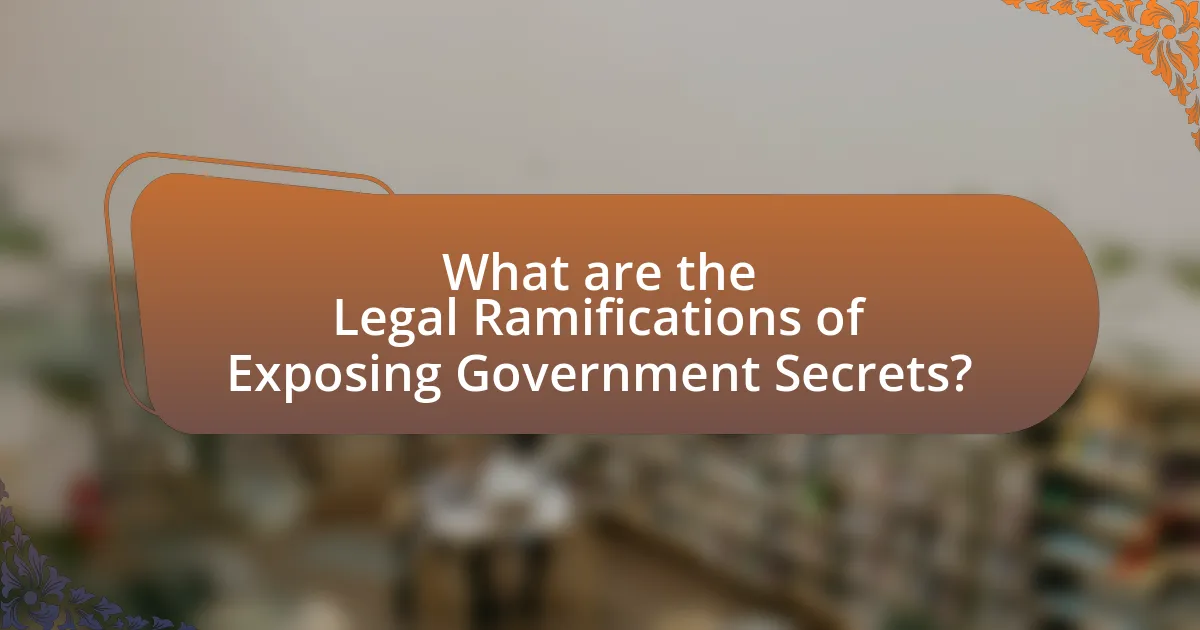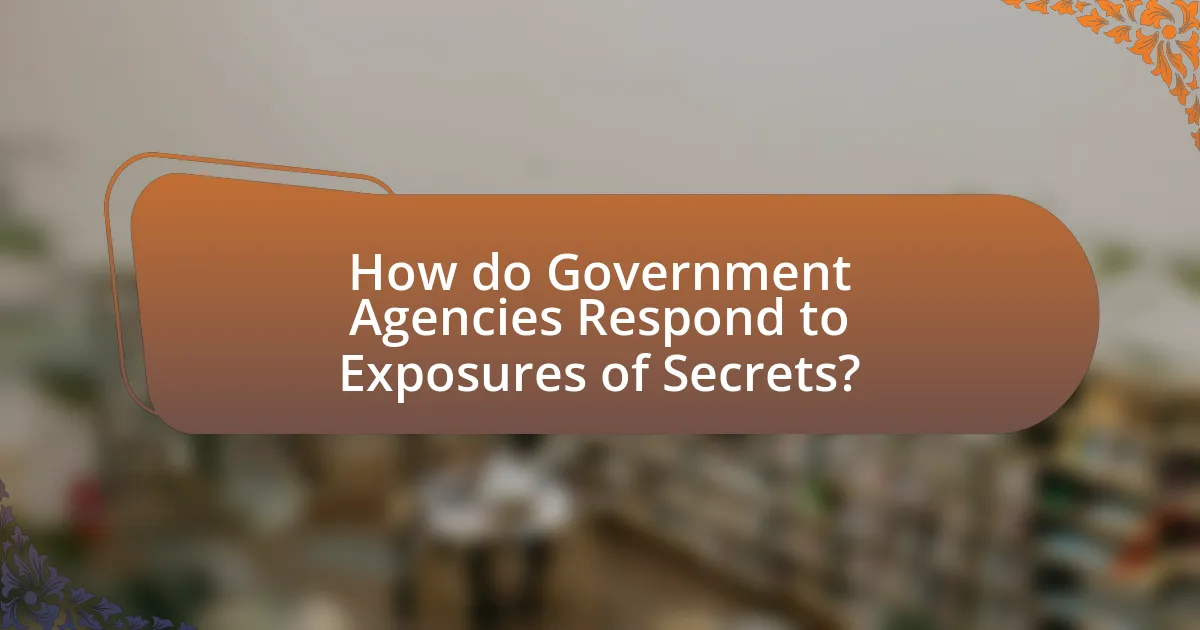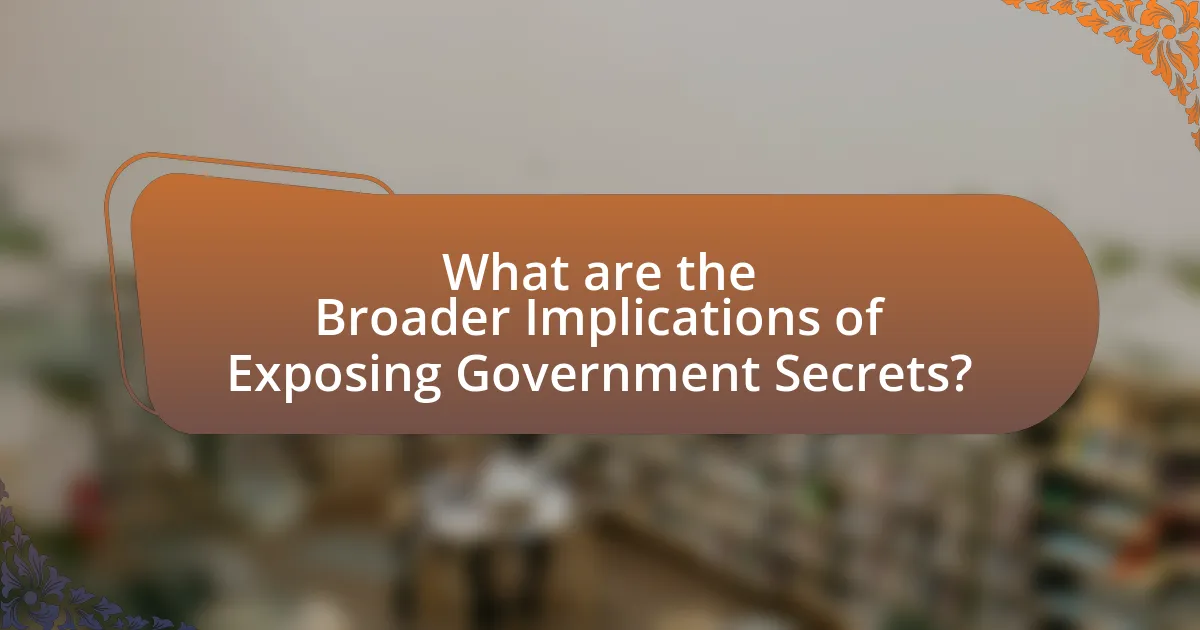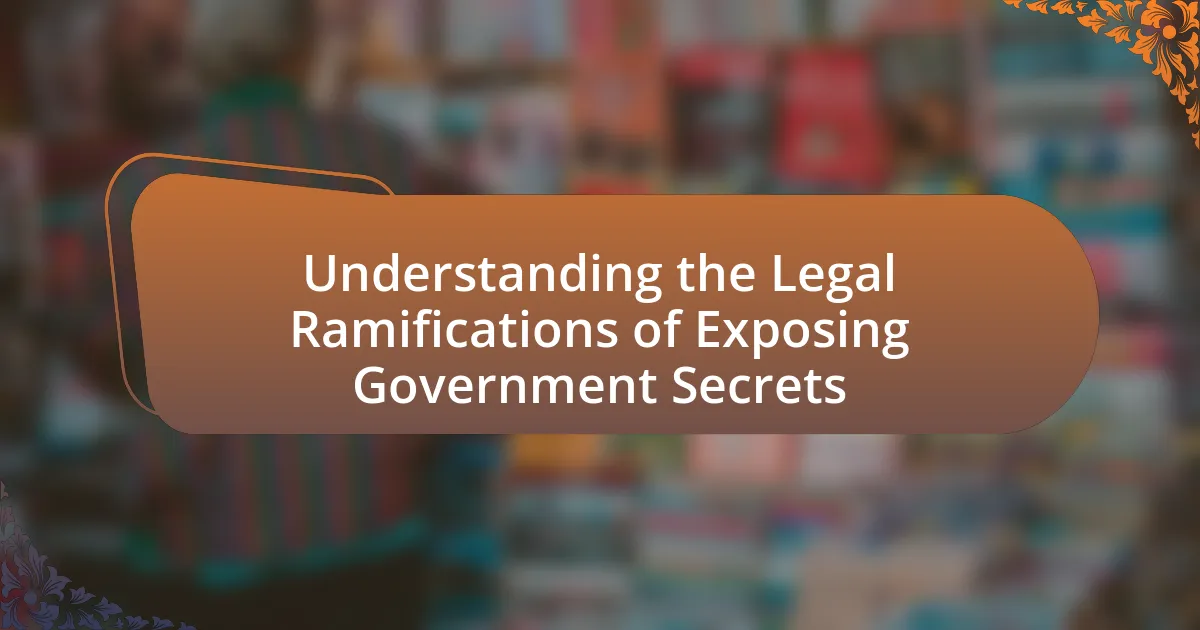The article focuses on the legal ramifications of exposing government secrets, detailing the potential criminal charges, civil penalties, and national security risks associated with such disclosures. It examines key laws governing the protection of classified information, including the Espionage Act and the Whistleblower Protection Act, while highlighting the varying legal frameworks across different countries. The article also discusses the consequences individuals may face for exposing secrets, the defenses available to them, and the broader implications for public trust and ethical considerations surrounding government transparency. Additionally, it outlines best practices for individuals contemplating exposure, emphasizing the importance of legal protection and risk assessment.

What are the Legal Ramifications of Exposing Government Secrets?
Exposing government secrets can lead to severe legal ramifications, including criminal charges, civil penalties, and national security risks. Individuals who disclose classified information may face prosecution under laws such as the Espionage Act, which can result in lengthy prison sentences. For instance, in 2013, Edward Snowden faced charges under this act for leaking NSA documents, highlighting the potential consequences of such actions. Additionally, whistleblower protections exist but are limited and do not shield individuals from prosecution if the information disclosed is deemed harmful to national security.
Why is the exposure of government secrets considered a legal issue?
The exposure of government secrets is considered a legal issue because it often violates laws designed to protect national security and classified information. These laws, such as the Espionage Act of 1917 in the United States, criminalize the unauthorized disclosure of sensitive information that could harm national interests or compromise security operations. Legal frameworks are established to balance the public’s right to know with the necessity of safeguarding state secrets, thus making unauthorized exposure a matter of legal accountability.
What laws govern the protection of government secrets?
The primary laws governing the protection of government secrets in the United States include the Espionage Act of 1917, the Classified Information Procedures Act (CIPA) of 1980, and the Freedom of Information Act (FOIA) of 1966. The Espionage Act criminalizes the unauthorized retention and disclosure of national defense information, while CIPA establishes procedures for handling classified information in legal proceedings. FOIA, although aimed at promoting transparency, includes exemptions that protect sensitive government information from disclosure. These laws collectively ensure that government secrets are safeguarded while balancing the need for public access to information.
How do these laws vary by country?
Laws regarding the exposure of government secrets vary significantly by country, reflecting differing legal frameworks, cultural attitudes, and political contexts. For instance, in the United States, the Espionage Act of 1917 criminalizes the unauthorized disclosure of national defense information, while the United Kingdom employs the Official Secrets Act, which has been in place since 1911, to protect state secrets. In contrast, countries like Sweden and Denmark have strong protections for whistleblowers, allowing individuals to disclose government misconduct without facing legal repercussions. This variation is further illustrated by the fact that some nations, such as Germany, have specific laws that balance the protection of state secrets with the public’s right to know, emphasizing transparency. These differences highlight how legal approaches to government secrecy are shaped by each country’s historical, political, and social landscape.
What are the potential consequences for individuals who expose government secrets?
Individuals who expose government secrets may face severe legal consequences, including criminal charges, imprisonment, and civil penalties. For instance, under the Espionage Act of 1917, individuals can be prosecuted for unauthorized disclosure of national defense information, with penalties ranging from fines to up to 10 years in prison for each violation. Additionally, whistleblowers may encounter retaliation, such as job loss, harassment, or blacklisting, which can significantly impact their careers and personal lives. Historical cases, such as those involving Edward Snowden and Chelsea Manning, illustrate the serious repercussions faced by individuals who disclose classified information, including lengthy prison sentences and ongoing legal battles.
What criminal charges can be faced?
Individuals who expose government secrets can face charges such as espionage, theft of government property, and unauthorized disclosure of classified information. Espionage, defined under the Espionage Act of 1917, can lead to severe penalties, including life imprisonment, if the disclosure is deemed to harm national security. Theft of government property involves unlawfully taking or using government documents, which can result in fines and imprisonment. Unauthorized disclosure of classified information, often prosecuted under various federal statutes, can also lead to significant legal consequences, including imprisonment and fines. These charges reflect the serious legal ramifications associated with exposing sensitive government information.
How can civil lawsuits arise from such exposures?
Civil lawsuits can arise from exposures of government secrets when individuals or entities claim harm due to the unauthorized disclosure of sensitive information. For instance, if a whistleblower reveals classified information that leads to financial loss, reputational damage, or personal harm to affected parties, those parties may file a civil lawsuit seeking damages. Legal precedents, such as the case of Pentagon Papers, illustrate how the release of classified documents can lead to civil actions based on claims of negligence or breach of confidentiality. Additionally, statutes like the Privacy Act can provide grounds for lawsuits if personal data is improperly disclosed, reinforcing the legal basis for civil claims stemming from such exposures.
What defenses are available for individuals accused of exposing government secrets?
Individuals accused of exposing government secrets can utilize several defenses, including the public interest defense, whistleblower protections, and the necessity defense. The public interest defense argues that the disclosure was made to inform the public about government misconduct or illegal activities, which can be supported by cases like the Pentagon Papers, where the Supreme Court upheld the right to publish classified information when it serves the public good. Whistleblower protections, established under laws such as the Whistleblower Protection Act, provide legal safeguards for individuals who report government wrongdoing, ensuring they cannot be retaliated against for their disclosures. The necessity defense may be invoked when the individual argues that exposing the secrets was essential to prevent imminent harm or danger, a principle recognized in various legal contexts. These defenses highlight the complexities surrounding the legal ramifications of exposing government secrets.
How does the whistleblower protection act apply?
The Whistleblower Protection Act applies by safeguarding individuals who report misconduct, fraud, or violations of laws within government agencies. This federal law prohibits retaliation against whistleblowers, ensuring they can disclose information without fear of losing their jobs or facing other adverse consequences. The Act specifically covers disclosures made to designated authorities, such as Congress or an Inspector General, and protects whistleblowers from disciplinary actions, demotions, or terminations. The effectiveness of the Act is evidenced by its role in encouraging the reporting of wrongdoing, which has led to significant investigations and reforms in various government sectors.
What role does public interest play in legal defenses?
Public interest serves as a critical factor in legal defenses, particularly in cases involving the exposure of government secrets. It can justify actions that might otherwise be deemed illegal, as courts often weigh the societal benefits of transparency against the potential harm of disclosing sensitive information. For instance, the landmark case of New York Times Co. v. United States established that the public’s right to know can outweigh the government’s interest in maintaining secrecy, thereby reinforcing the role of public interest in legal defenses. This principle is further supported by the First Amendment, which protects freedom of speech and press, allowing for legal defenses that argue the necessity of disclosure for public welfare.

How do Government Agencies Respond to Exposures of Secrets?
Government agencies respond to exposures of secrets by initiating investigations, implementing damage control measures, and pursuing legal actions against individuals involved in the disclosure. For instance, when classified information is leaked, agencies like the CIA or NSA typically conduct internal reviews to assess the breach’s impact and identify the source. They may also enhance security protocols to prevent future incidents. Legal actions can include prosecution under laws such as the Espionage Act, which has been used historically to penalize unauthorized disclosures of national defense information. This response framework is designed to protect national security interests and maintain the integrity of sensitive information.
What measures do government agencies take to prevent leaks?
Government agencies implement various measures to prevent leaks, including strict security protocols, employee vetting, and monitoring of communications. These agencies often utilize classified information systems that restrict access to sensitive data based on the principle of least privilege, ensuring only authorized personnel can view specific information. Additionally, regular training on confidentiality and the legal consequences of unauthorized disclosures is mandated for employees. Agencies also employ technological solutions such as encryption and intrusion detection systems to safeguard data. According to a report by the Government Accountability Office, these measures are essential in maintaining national security and protecting sensitive information from unauthorized access.
How effective are these measures in practice?
The effectiveness of measures to expose government secrets varies significantly based on context and implementation. In practice, legal protections for whistleblowers, such as the Whistleblower Protection Act in the United States, have been shown to encourage reporting of misconduct, with studies indicating that whistleblowers play a crucial role in uncovering fraud and corruption. For instance, a report by the Government Accountability Office found that whistleblower disclosures led to over $1.5 billion in recoveries for the federal government between 2010 and 2019, demonstrating the tangible impact of these measures. However, challenges remain, including fear of retaliation and inadequate enforcement of protections, which can undermine their overall effectiveness.
What role does technology play in safeguarding secrets?
Technology plays a crucial role in safeguarding secrets by employing advanced encryption methods, secure communication channels, and data protection protocols. These technological measures ensure that sensitive information remains confidential and inaccessible to unauthorized individuals. For instance, encryption algorithms like AES (Advanced Encryption Standard) are widely used to protect data at rest and in transit, making it nearly impossible for adversaries to decipher without the correct keys. Additionally, secure communication platforms, such as those utilizing end-to-end encryption, protect messages from interception during transmission. The implementation of these technologies is essential in maintaining national security and protecting government secrets from espionage and leaks.
What actions can government agencies take against whistleblowers?
Government agencies can take various actions against whistleblowers, including retaliation, termination of employment, legal prosecution, and harassment. Retaliation may manifest as demotion, reassignment to less favorable positions, or negative performance evaluations. Termination of employment can occur if the agency deems the whistleblower’s actions as a breach of confidentiality or loyalty. Legal prosecution may involve charges related to unauthorized disclosure of classified information, which can lead to criminal penalties. Harassment can include intimidation tactics or creating a hostile work environment to discourage whistleblowing. These actions are often intended to silence whistleblowers and deter others from reporting misconduct.
What are the implications of retaliation against whistleblowers?
Retaliation against whistleblowers can lead to significant legal and organizational implications. Legally, it can result in lawsuits under various whistleblower protection laws, such as the Whistleblower Protection Act in the United States, which prohibits retaliation against federal employees who disclose information they reasonably believe evidences a violation of law. Organizations may face reputational damage, loss of employee trust, and decreased morale, which can hinder their operational effectiveness. Furthermore, studies indicate that workplaces with a culture of retaliation experience higher turnover rates and lower employee engagement, ultimately impacting productivity and innovation.
How do agencies balance transparency and secrecy?
Agencies balance transparency and secrecy by implementing policies that allow for the disclosure of information while protecting sensitive data. For instance, the Freedom of Information Act (FOIA) enables public access to government records, yet it includes exemptions for national security, personal privacy, and law enforcement matters. This dual approach ensures that agencies can maintain public trust through transparency while safeguarding critical information that could jeopardize security or operational integrity. The effectiveness of this balance is evident in the way agencies regularly publish reports and data, while also withholding classified information, demonstrating a commitment to accountability without compromising safety.

What are the Broader Implications of Exposing Government Secrets?
Exposing government secrets can lead to significant political, social, and security implications. Politically, it may undermine public trust in government institutions, as seen in the aftermath of the Edward Snowden revelations, which sparked global debates about privacy and surveillance. Socially, it can mobilize public opinion and activism, influencing policy changes and accountability measures. Security-wise, the exposure of sensitive information can jeopardize national security, endanger lives, and compromise intelligence operations, as evidenced by the WikiLeaks disclosures that revealed classified military documents. These implications highlight the complex interplay between transparency, accountability, and security in governance.
How does exposing government secrets affect public trust?
Exposing government secrets generally erodes public trust. When confidential information is revealed, it often leads to perceptions of government incompetence, dishonesty, or malfeasance. For instance, the release of the Pentagon Papers in 1971 significantly diminished trust in the U.S. government, as it exposed misleading information regarding the Vietnam War. Studies indicate that transparency can enhance trust, but when secrets are revealed, especially those that suggest wrongdoing, public confidence typically declines. This decline is evidenced by surveys showing that trust in government institutions often drops following major leaks or scandals.
What historical examples illustrate this impact?
The Pentagon Papers case in 1971 illustrates the impact of exposing government secrets, as it led to a landmark Supreme Court decision affirming the press’s right to publish classified information. The case involved the New York Times and the Washington Post publishing a top-secret Department of Defense study about the Vietnam War, which revealed government deception regarding U.S. involvement. The Supreme Court ruled in favor of the newspapers, emphasizing the importance of a free press in a democratic society, thereby setting a precedent for future cases involving national security and freedom of speech. Another example is the Watergate scandal, which involved the exposure of government misconduct and led to President Richard Nixon’s resignation in 1974, highlighting the consequences of government secrecy and the role of investigative journalism in holding officials accountable.
How do media portrayals influence public perception?
Media portrayals significantly influence public perception by shaping narratives and framing issues in specific ways. For instance, the portrayal of whistleblowers in news outlets can either cast them as heroes or traitors, which directly affects public opinion on government transparency and accountability. Research by the Pew Research Center indicates that media coverage can sway public attitudes, with 63% of Americans stating that news stories influence their views on political issues. This demonstrates that the way media presents information about government actions and secrets can lead to varying levels of trust or distrust among the public.
What ethical considerations arise from exposing government secrets?
Exposing government secrets raises significant ethical considerations, primarily concerning the balance between transparency and national security. Ethical dilemmas arise when the public’s right to know conflicts with the potential harm that disclosure may cause to individuals, national interests, or international relations. For instance, revealing classified information can jeopardize the safety of intelligence operatives or compromise ongoing operations, as seen in cases like the WikiLeaks disclosures, which exposed sensitive diplomatic communications and military operations. Additionally, the ethical implications extend to the motivations behind the exposure; if the intent is to inform the public about government misconduct, it may be viewed more favorably than if the intent is to undermine governmental authority or create chaos. Thus, the ethical landscape surrounding the exposure of government secrets is complex, requiring careful consideration of the potential consequences and motivations involved.
How do ethical frameworks guide decisions on exposure?
Ethical frameworks guide decisions on exposure by providing a structured approach to evaluate the moral implications of revealing sensitive information. These frameworks, such as utilitarianism, deontology, and virtue ethics, help individuals and organizations assess the potential consequences of exposure against ethical principles. For instance, utilitarianism emphasizes the greatest good for the greatest number, prompting decision-makers to consider the broader societal impact of disclosing government secrets. Deontological ethics focuses on adherence to rules and duties, which may lead to prioritizing legal obligations over potential benefits of exposure. Additionally, virtue ethics encourages individuals to reflect on their character and the moral values they wish to uphold when making exposure decisions. By applying these ethical frameworks, stakeholders can navigate the complex legal ramifications associated with exposing government secrets, ensuring that their actions align with both ethical standards and legal requirements.
What are the moral responsibilities of whistleblowers?
Whistleblowers have the moral responsibility to expose wrongdoing, protect public interest, and ensure accountability within organizations. By reporting unethical or illegal activities, they contribute to transparency and uphold ethical standards. This responsibility is underscored by the potential harm that can arise from silence, such as continued misconduct or harm to individuals and society. For instance, the case of Edward Snowden highlighted the moral imperative to disclose government surveillance practices that violated privacy rights, demonstrating how whistleblowers can catalyze important public discourse and reform.
What best practices should individuals consider before exposing government secrets?
Individuals should thoroughly assess the legal implications and potential consequences before exposing government secrets. This includes understanding the laws surrounding whistleblowing, such as the Whistleblower Protection Act, which provides legal safeguards for individuals who report misconduct. Additionally, individuals should evaluate the potential risks to national security and personal safety, as exposure may lead to criminal charges or retaliation. Consulting with legal experts or organizations specializing in whistleblower rights can provide guidance on the best course of action. Furthermore, documenting evidence and ensuring that the information is in the public interest can strengthen the case for disclosure.
How can individuals assess the risks involved?
Individuals can assess the risks involved in exposing government secrets by conducting a thorough analysis of legal frameworks, potential consequences, and personal implications. This involves researching relevant laws, such as the Espionage Act, which outlines penalties for unauthorized disclosure of classified information, and understanding the legal protections available for whistleblowers. Additionally, individuals should evaluate the likelihood of prosecution, the impact on their career and personal life, and the potential for retaliation. Studies indicate that whistleblowers often face significant professional and social repercussions, highlighting the importance of a comprehensive risk assessment before taking action.
What steps can be taken to protect oneself legally?
To protect oneself legally when exposing government secrets, individuals should consult with an attorney specializing in whistleblower laws. Engaging legal counsel ensures that one understands the protections available under laws such as the Whistleblower Protection Act, which safeguards individuals from retaliation for reporting misconduct. Additionally, documenting all communications and actions related to the exposure can provide crucial evidence if legal issues arise. It is also advisable to report concerns through official channels to establish a formal record, which can further support legal protection.
